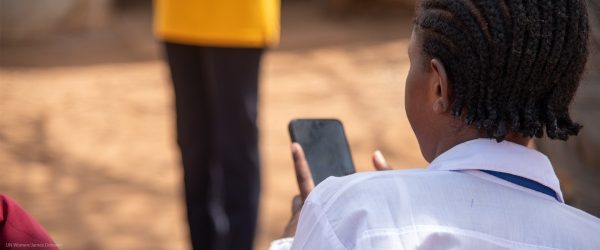Creating safe digital spaces free of trolls, doxing, and hate speech
November 14, 2023 · By UNwomen.org for www.unwomen.org

Photo: UN Women/James Ochweri.
Creating safe digital spaces free of trolls, doxing, and hate speech
Despite the enormous potential of technology, digital tools, and the internet, these have also perpetuated gender disparities and introduced new forms of oppression for women and girls.
For many, technology-facilitated gender-based violence, is new terminology but not new phenomena.
Technology-facilitated gender-based violence takes many forms, including cyberbullying, online harassment, hate speech, doxing, intimate image abuse, trolling, or deep fakes.
Women, girls, and gender-non-conforming individuals are more likely to be targeted and experience more severe and lasting consequences because of their gender. Studies across the world show that 16 to 58 per cent of women and girls have been targeted by violence online.
The impacts of this type of violence extend beyond the digital sphere, entrenching inequalities and posing a significant threat to women’s rights and safety both online and off.
How does digitalization impact violence against women and girls?
To effectively prevent online and technology-facilitated violence, it is crucial to understand its specificities and its impact on women and girls.
- Online and technology-facilitated violence have unique characteristics that set them apart from other forms of gender-based violence due to their speed, scale, and impact. Such abuse can quickly cross borders, making it difficult to prevent and stop. Harmful and threatening content and images are disseminated, shared, or threatened to be shared by others, violence and abuse are repeated, and victims or survivors are retraumatised.
- A 2021 UN Women study in the Arab States region found that 60 per cent of women internet users had been exposed to online violence that year. A European study found that women are 27 times more likely to face harassment online than men, and another analysis found that 92 per cent of women reported that online violence negatively influences their wellbeing.
- It negatively influences the voices of women in the public eye. A study on online violence against women journalists found that 73 per cent of women journalists have experienced online violence. Research drawing from interviews with women in the public eye across 15 Latin American and Caribbean countries found that 80 per cent of respondents restricted their online participation due to fears about expressing their opinions on certain topics and concerns for their physical safety and lives. Another study found that 46 per cent of women parliamentarians in Africa were subjected to online sexist attacks.
- Young women, girls, LGBTIQ+ persons, women with disabilities and racialized, minoritized and migrant groups of women are more likely to experience more extreme and frequent forms of digital violence.
Strategies to prevent violence against women and girls in the digital realm
Preventing violence in the digital age is crucial to gender equality. The negative impact of technology-facilitated violence can be widespread and far-reaching, therefore taking steps to prevent it and ensure everyone, regardless of gender, can safely participate in the digital world should be a priority.
Engaging young people
According to global research, most women report their first experience of social media harassment between the ages of 14 and 16, with one study noting 58 per cent of young women and girls surveyed reporting some form of online harassment. UN Women works closely with young people to find solutions to these complex forms of violence that disproportionately target them.
In Asia and the Pacific, the 30 for 2030 regional youth cohort created a social-media-friendly toolkit to raise awareness, empower youth and offer tailored recommendations on prevention of technology-facilitated gender-based violence for governments, the private sector, women and youth-led organizations and schools.
In Africa, a joint UN International Youth Conference pinpointed ways to address technology-driven violence against women and girls. Young participants called for legal reforms, more women in decision-making, better reporting, and increased pressure on digital service providers to enhance protection.
Pushing for more accountability and female representation
Women and girls remain underrepresented across the creation, use, and regulation of technology. Only 28 per cent of engineering graduates, 22 per cent of artificial intelligence workers, and less than one third of tech sector employees globally are women. This limits the digital empowerment of women and girls while also hindering the transformative potential of technology.
Many emerging digital technologies remain widely unregulated. Effective measures to tackle the challenges associated with the use of such technologies are essential, particularly those that have the potential to have adverse impacts on gender equality and the empowerment of all women and girls. Online service providers should proactively mitigate the risk of technology misuse against women and girls when creating and updating technology products as well as prioritizing ethics, safety, and privacy in design phase of these products.
Digital campaigns
Innovative digital tools can be particularly useful to address online, and technology-facilitated violence on the platforms where it thrives.
The Fireflies campaign created an international support network and built awareness on a global scale by providing a safer digital space for women and girls.
UN Women has also launched a series of videos featuring women from around the world, animations, and statistics to inform and engage audiences on technology and violence. Examples include “Amira: A day in the life of a woman victim of online violence“, a short that explains what online violence against women and girls means for victims and how to react to such attacks.
Multisectoral partnerships
In 2021, UN Women launched Generation Equality, the world’s leading initiative to boost investment and implementation of gender equality. Governments, civil society organizations, and private sector partners have pledged to develop policies, solutions, and prevention of technology-facilitated gender-based violence by 2026.
UN Women also informs the Global Partnership for Action on Gender-based Online Harassment and Abuse, launched in 2022.
These efforts aim to empower women, bridge the digital gender divide, and create a safer online environment, fostering gender equality and empowerment.






